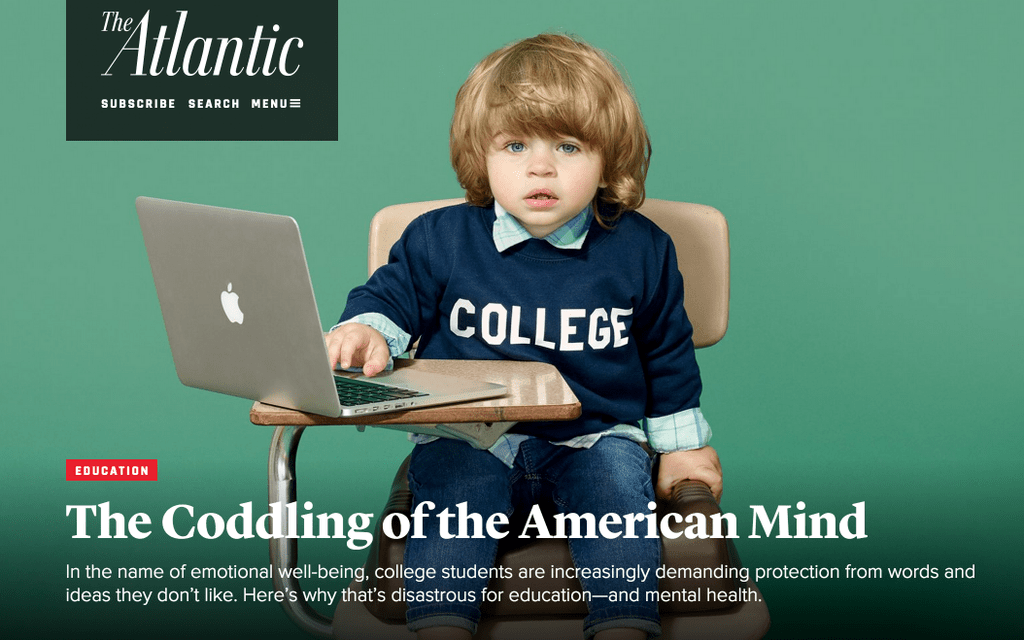Educators Whine About Trigger Warnings at Colleges; and They Say Students Need Coddling?

It’s amazing to me that this is actually still a “serious discussion” that’s happening. But apparently, too many college educators still completely misunderstand trigger warnings, how they’re supposed to function, and what they actually do. Here’s what they don’t do – hinder academic freedom.
A recent survey done by the National Coalition Against Censorship revealed that of 800 college educators surveyed, more than 60 percent said that “trigger warnings pose a threat to academic freedom” and about 45 percent said they are “detrimental to classroom discussions.”
First of all, you’d think that the National Coalition Against Censorship would have a better understanding of what censorship actually is. And yet they open their survey with:
As a cover story in The Atlantic put it, “A movement is arising, undirected and driven largely by students, to scrub campuses clean of words, ideas, and subjects that might cause discomfort or give offense.”
A broad range of instructional materials, from a documentary about sexual assault to an historical account of slavery, could be considered ‘triggering.’ If professors steer clear of potentially controversial work, either out of concern for students’ well-being or fear of getting in trouble with administrators, the free speech implications are enormous.
OK, that right there – that part I put in bold – that’s the fundamental thing that everyone keeps misunderstanding. *grabs bullhorn* NO ONE IS TELLING ANYONE WHAT THEY CAN AND CAN’T TEACH. Especially not in a college setting. Trigger warnings are just that – warnings. That’s it. And if you see those warnings as a threat to expression, then so are ratings on movies and television shows!
The assumption is always that, by fighting for these warnings, students are cocooning themselves against learning or talking about certain things. It’s assumed that, if you warn a student about sensitive content, they’re going to run screaming for the hills. Instead, let’s frame it this way: trigger warnings prepare students to talk about certain things.
It’s like, if you were to warn someone that up ahead there’s a huge hole – a person could then choose to a) not walk in that direction, b) go around the hole, c) bring a ladder, climb down into the hole, walk to the other side, then climb out of it again, or d) fly over the hole. The point is, trigger warnings give people options as to how they want to handle certain material, while asking almost nothing of college professors. They wouldn’t have to change their curriculum or reading material one iota if they didn’t want to.
Now, here’s the thing – trigger warnings are difficult, because even among those who’ve suffered trauma, people’s triggers are different. For some, it may be the mention of graphic sexual assault. For others, it may be the smell of a certain food that happened to be in the room when they experienced a traumatic event. So, I understand that instituting university-wide policies is damn near impossible, because there’s no way to be able to incorporate every person’s triggers.
However, I do think that students need to be encouraged to bring their specific needs to the school, or to their professors, without the fear of being thought and treated like a big baby because they “can’t handle” certain topics, or want them discussed in a more sensitive or inclusive way. Because the real “big babies” in this scenario are professors and administrators who can’t be bothered to deal with listening. Educators who can’t bear to have the way that they teach things challenged. Professors who are so afraid that a small percentage of students might walk out of their class on a particular day that, rather than risk their audience being diminished, they’d rather remain blissfully ignorant of issues of concern to their students, cocooning themselves against having to deal with an alternate view of education.
Who’s being coddled now?
(via Houston Chronicle; Image via Twitter)
—Please make note of The Mary Sue’s general comment policy.—
Do you follow The Mary Sue on Twitter, Facebook, Tumblr, Pinterest, & Google +?
Have a tip we should know? tips@themarysue.com